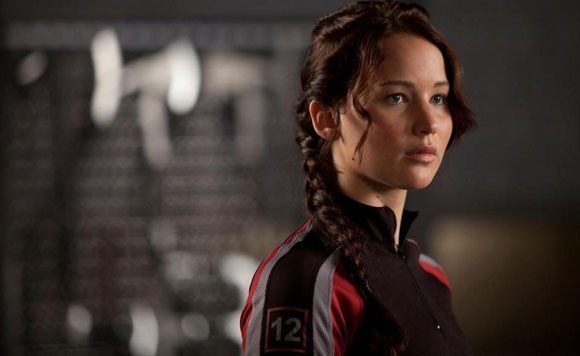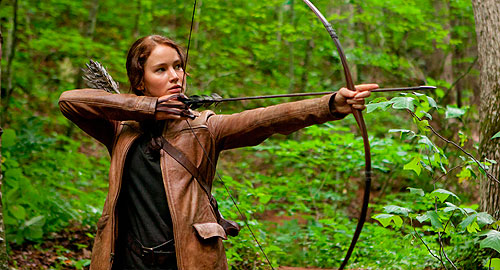Although it’s based on a best-selling young adult novel, it’s safe to say the odds weren’t in The Hunger Games’ favor. True, the film was projected to do well at the box office but history likes to tell us female-led action films don’t sell. It’s often used as an excuse in Hollywood to not make those films. They can’t use that excuse anymore, Jennifer Lawrence helped The Hunger Games make a record $155 million this past weekend and she did it with all of her clothes on.
Yesterday we told you Box Office Mojo was estimating that the film would make $155 million opening weekend but that was just an estimate. It actually did make that much which puts The Hunger Games in the history books as the biggest non-sequel U.S. debut for a film ever according to HitFlix.
Box Office Mojo says The Hunger Games “ranks third all-time behind Harry Potter and the Deathly Hallows Part 2 ($169.2 million) and The Dark Knight ($158.4 million).” This is really big news.
The Hunger Games managed to beat not just Batman but several other huge comic blockbusters as well like Spider-Man 3 and Iron Man 2, which are the next two highest grossing comic films after The Dark Knight. It also lies ahead of Twilight: New Moon which sits at number five on the biggest opening weekend films list. The film is also the bggest success for Lionsgate which is an independent studio currently merging with Twilight studio, Summit Entertainment. And the film remained strictly in 2D.
And guess what else? The film’s viewers were approximately 61% female and 56% were ages 25 and up according to Lionsgate. Those numbers themselves are an interesting indicator. It wasn’t just women going to see this film and it wasn’t just young girls who were the intended market for the original book.
The Hollywood Reporter writes, “Box office observers believe that Hunger Games, based on Suzanne Collins’ bestselling dystopian young adult novel, could gross between $350 million and $400 million domestically based on its strength across all demos, including families, and particularly among tweens and teens, who are huge repeat moviegoers.”
But there’s an even more important lesson to take away from The Hunger Games success. Not only did a wide range of viewers head out to see an action film with a female lead, they saw a film with a female action lead who wasn’t sexualized to grab attention or play into the archaic view that a lead actress is only there for eye candy. I suppose you could thank Collins’ novel which created a character that was simply a normal girl or the fact that the writer had a heavy hand in production of the film but for once, Hollywood didn’t try to change the character to suit marketing norms. Twenty-one-year-old Lawrence’s costumes throughout the film are suited to the enviornment and no, her top doesn’t get strategically torn so you can see her midriff at any point. It’s refreshing.
Oddly enough, there’s been a rather alarming number of reviews for the film that reference Lawrence’s weight and looks. Slate has a roundup of a few:
“A few years ago Ms. Lawrence might have looked hungry enough to play Katniss,” writes the New York Times’ Manohla Dargis, “but now, at 21, her seductive, womanly figure makes a bad fit for a dystopian fantasy about a people starved into submission.” The Hollywood Reporter’s Todd McCarthy comments that Lawrence’s “lingering baby fat shows here.” And—most bluntly—Hollywood Elsewhere’s Jeffrey Wells calls Lawrence a “fairly tall, big-boned lady” who’s “too big” for Josh Hutcherson, who plays Katniss’s romantic interest.
First of all, ugh. Second of all, you’re all terrible and wrong and these box office numbers prove it. So perhaps the lesson here is not just that a healthy, realistic looking actress can be a successful action star but that perhaps that’s what Hollywood should specifically be looking for in the future. Because it works and audiences will happily go see it. Like Bridesmaids, The Hunger Games broke the usual Hollywood mold and proved that women can drive a hit and they don’t need to be half-dressed. They also don’t have to be chasing after a boy. Katniss has two men in her life, sure, but they aren’t her primary concern, unlike Bella from Twilight.
The success of The Hunger Games is officially paving the way for other female-led action films, whether they’re comic book characters or not, to be greenlit in Hollywood. I’m sure some will still take this the wrong way and try to translate the box office numbers of The Hunger Games by putting a similar character out there who’s the usual bombshell actress or that exceptions will be made by critics for why this particular film was a success but others wouldn’t be but executives look for proven success and precedent and it’s staring them in the face now. We haven’t had a female action star like this for a while. Let’s hope they don’t ignore it.
- There Totally Should Have Been Capitol Commercials In The Hunger Games [VIDEO]
- The Mary Sue’s Hunger Games Review!
- Check Out This Hunger Games/Simpsons Mashup









Published: Mar 26, 2012 11:56 am